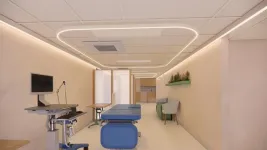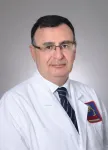(Press-News.org) Mount Sinai’s Department of Rehabilitation and Human Performance has announced the grand opening of the Cohen Center for Recovery From Complex Chronic Illnesses (CoRE), providing clinical care for patients with conditions such as long Lyme disease/Lyme+, long COVID, and other infection-associated complex chronic illnesses such as myalgic encephalomyelitis/chronic fatigue syndrome (ME/CFS) and Ehlers-Danlos syndrome (EDS).
Supported by philanthropy from various donors, including an inaugural gift from Beth and Joshua Nash and a naming gift from the Steven & Alexandra Cohen Foundation and, the $10-million Center is located at The Mount Sinai Hospital at 5 East 98th Street on Manhattan’s Upper East Side.
The state-of-the-art facility is equipped to handle up to 700 new patients a year. The center is also launching new research programs focusing on understanding and highlighting the key similarities and differences between people living with long COVID and long Lyme disease/Lyme+, ME/CFS, EDS, and other infection-associated complex chronic illnesses. This enhanced understanding will help clinicians and researchers at Mount Sinai develop and test novel therapies for these conditions.
With a grant from and collaboration with the PolyBio Research Foundation, the Center is also leading multiple clinical trials for promising new therapies for infection-associated complex chronic illness. One will focus on the effectiveness of using antiviral medications to treat people with long COVID. Another clinical trial will test whether the enzyme lumbrokinase can help to break down microclots found in the blood of participants with long COVID and/or ME/CFS. Past studies have shown that the formation of microclots in the blood may contribute to overall symptom severity in these patients.
“Our Center will be one of the few places in the world embedded in a major clinical institution that’s able to provide outstanding care management as well as leading-edge research focused on biological discovery,” says David Putrino, PhD, who will serve as the Nash Family Director of the Center for Recovery From Complex Chronic Illnesses. Dr. Putrino is also a Professor of Rehabilitation and Human Performance at the Icahn School of Medicine at Mount Sinai and the Director of Rehabilitation Innovation for the Mount Sinai Health System. “A crucial part of our process is that our clinicians, patients, and researchers are in constant contact and communication. This is how we plan to foster the innovative and rapid work that will drive discovery and cures for people who need solutions today.”
The space has been specifically designed to create a relaxing atmosphere with natural light and soft colors to create a welcoming feel. It uses biophilic design, a concept that aims to increase connectivity to the natural environment through direct and indirect exposure to nature. This can benefit people with infection-associated complex conditions who frequently experience dysautonomia/autonomic nervous system dysfunction – a disorder that impacts the regulation of the body’s psysiologic process including heart rate, blood pressure and respiration - their symptoms can be worsened by harsh lighting and bright surroundings. The Center also has infection prevention infrastructure that includes HEPA filters and germicidal far-UV light technology, which rapidly remove viruses and other aerosols from the air.
At the Center, patients will undergo specialized rehabilitation with a physical therapy team with expertise in autonomic rehabilitation to address autonomic dysfunction, which is experienced by at least 70 percent of people with infection-associated complex chronic illness. For detailed assessment of the autonomic nervous system, the Center features a next-generation patient assessment platform including postural testing, continuous blood pressure monitoring, tilt-table testing, and sudomotor testing, which helps evaluate the portion of the autonomic nervous system that controls the ability to sweat. These components have been developed specifically for the assessment of long COVID, long Lyme disease, and other chronic conditions that arise following an acute infection. After the assessment, physicians at the Center medically manage the clinical care of patients and use the latest evidence to prescribe medications that are known to be effective in the management of concurrent conditions such as latent viral reactivation and mast cell activation syndrome.
The Center will offer novel technological therapies (non-pharmacological) for chronic pain. These evidence-based approaches include virtual, augmented, and mixed reality; transcranial magnetic stimulation; and other noninvasive brain stimulation technologies. Additionally patients will have access to personalized cognitive rehabilitation for help with cognitive impairment, a common symptom of infection-associated complex chronic illnesses. The Center will also research novel therapies, including the role of multiple natural supplements in care management and the repurposing of existing antimicrobial and antiviral medications to treat evidence of persistent infections seen in people with long COVID and other infection-associated chronic conditions, as well as immunotherapies to treat dysregulation of the immune system that can commonly occur.
About the Mount Sinai Health System
Mount Sinai Health System is one of the largest academic medical systems in the New York metro area, with 48,000 employees working across eight hospitals, more than 400 outpatient practices, more than 600 research and clinical labs, a school of nursing, and a leading school of medicine and graduate education. Mount Sinai advances health for all people, everywhere, by taking on the most complex health care challenges of our time—discovering and applying new scientific learning and knowledge; developing safer, more effective treatments; educating the next generation of medical leaders and innovators; and supporting local communities by delivering high-quality care to all who need it.
Through the integration of its hospitals, labs, and schools, Mount Sinai offers comprehensive health care solutions from birth through geriatrics, leveraging innovative approaches such as artificial intelligence and informatics while keeping patients’ medical and emotional needs at the center of all treatment. The Health System includes approximately 9,000 primary and specialty care physicians and 11 free-standing joint-venture centers throughout the five boroughs of New York City, Westchester, Long Island, and Florida. Hospitals within the System are consistently ranked by Newsweek’s® “The World’s Best Smart Hospitals, Best in State Hospitals, World Best Hospitals and Best Specialty Hospitals” and by U.S. News & World Report's® “Best Hospitals” and “Best Children’s Hospitals.” The Mount Sinai Hospital is on the U.S. News & World Report® “Best Hospitals” Honor Roll for 2024-2025.
For more information, visit https://www.mountsinai.org or find Mount Sinai on Facebook, Twitter and YouTube.
END
Mount Sinai opens state-of-the-art center for patients with complex conditions including Lyme disease and long COVID
2024-10-10
ELSE PRESS RELEASES FROM THIS DATE:
$14M NIH grant funds gene-editing research for rare metabolic diseases at Penn and CHOP
2024-10-10
PHILADELPHIA— A $14M grant will fund research on gene-editing therapies for rare metabolic diseases at the Perelman School of Medicine at the University of Pennsylvania (Penn) and Children’s Hospital of Philadelphia (CHOP). The research will focus specifically on developing therapies for urea cycle disorders, which impact roughly 1 in every 35,000 children. Using a form of CRISPR technology, the ultimate vision of the four-year grant is to create a platform for rapid development of personalized gene-editing therapies for ...
One experiment: The brain’s landscapers
2024-10-10
Imagine yourself sometime in the far future aboard a routine rocket to Mars. Someone just spilled their drink. Without gravity, it collects in floating blobs that ripple right before your eyes. Now freeze.
What you see might look something like the above image from Cold Spring Harbor Laboratory’s (CSHL’s) Cheadle lab. But those purple and green blobs aren’t the floating remains of somebody’s drink. They’re mysterious cells in the brain’s visual cortex called OPCs.
The visual cortex processes everything we see. Incoming visual information is ...
AI-supported dermatology: Now for darker skin tones too, thanks to a new data set
2024-10-10
In many countries in Africa, up to nine out of ten children suffer from a skin problem, and there are far too few local dermatologists. Artificial intelligence could help with diagnosis, but needs to be trained with the relevant images, so researchers have created a new data set for dark skin tones.
Demand is high, the lack of dermatologists acute: in many countries in Africa, there is less than one dermatology specialist per one million people – compared to the World Health Organization (WHO) recommendation of ...
Understanding how smiling influences relationship building during real-life conversations
2024-10-10
Smiling during conversations creates warmth, making people feel more comfortable and connected. For example, a friendly smile when meeting someone new can ease nervousness. A smile can soften tension in a debate, showing respect among the participants despite disagreement. In fact, extensive studies have been conducted in the past in an attempt to understand smiling interactions in a natural conversation. Despite these studies, however, little is known about the extent to which one’s smile influences or gets affected by the other person’s smile during a conversation.
A new study sought to investigate this by quantifying ...
British Heart Foundation Data Science Centre launches first open challenge to explore AI ECG potential
2024-10-10
The British Heart Foundation (BHF) Data Science Centre, led by Health Data Research UK, is hosting an open challenge which invites competitors to explore the potential of Artificial Intelligence to improve the use of electrocardiogram (ECG) for cardiovascular disease patient care. The challenge has been co-designed with members of public and patients affected by cardiovascular disease.
The BHF Data Science Centre is collaborating with experts from the University of Edinburgh to use a synthetic imaging dataset made up of approximately 20,000 simulated electrocardiogram (ECG) images. Competitors will be invited to develop algorithms which can make ...
Heart failure, atrial fibrillation & coronary heart disease linked to cognitive impairment
2024-10-10
Statement Highlights:
Previous studies have found that 14-81% of patients with heart failure experience some degree of cognitive impairment affecting language, memory or executive function.
Evidence also indicates that people with atrial fibrillation have a 39% increased risk of memory or thinking problems; adults with heart disease have a 27% higher risk of developing dementia; and up to 50% of individuals experience cognitive decline after a heart attack.
Managing heart health from an early age is important, not only for preventing heart disease but also for protecting brain health and reducing the risk of cognitive impairment in later life.
Embargoed until 4:00 a.m. CT/5:00 ...
To make children better fact-checkers, expose them to more misinformation — with oversight
2024-10-10
In an era when online misinformation is seemingly everywhere and objective facts are often in dispute, UC Berkeley psychologists in a new study have presented a somewhat paradoxical partial solution: Expose young children to more misinformation online — not less.
Doing so in limited circumstances, and with careful oversight and education, can help children gain the tools they'll need to sort fact from fiction online, said Evan Orticio, a Ph.D. student in UC Berkeley’s Department of Psychology and lead author of a paper published today ...
Renowned psychiatrist professor Celso Arango advocates for primary prevention in mental health
2024-10-10
In a revealing Genomic Press Interview published in Brain Medicine on October 10, 2024, Professor Celso Arango, a prominent psychiatrist and researcher, outlines his vision for the future of mental health care. Professor Arango, who serves as Director of the Institute of Psychiatry and Mental Health at Hospital General Universitario Gregorio Marañón and Professor of Psychiatry at the Universidad Complutense de Madrid, advocates for a paradigm shift towards primary prevention in psychiatry.
Professor Arango's career trajectory, from his early exposure to ...
Ketamine pioneer Dr. Carlos A. Zarate Jr. reshapes depression treatment landscape
2024-10-10
Bethesda, Maryland - 10 October 2024. In a revealing Genomic Press Interview published on 10 October 2024, Dr. Carlos A. Zarate Jr., NIH Distinguished Investigator and pioneer in rapid-acting antidepressant research, offers a glimpse into the personal motivations and scientific breakthroughs that have defined his career. The interview, part of the journal's Innovators and Ideas series, showcases Dr. Zarate's journey from a young tennis instructor in Argentina to a leading figure in psychiatric research at the National Institute ...
Glowing approach could aid carpal tunnel-related surgery
2024-10-10
In modern office life, avoiding the onset of carpal tunnel syndrome might be a daily struggle. The worst case could mean needing surgery to alleviate compression of the nerves or to repair damaged nerves. Helping surgeons visually check the areas where neural blood flow has decreased due to chronic nerve compression can lead to improvements in diagnostic accuracy, severity assessments, and outcome predictions.
With this in mind, an Osaka Metropolitan University-led research team involving Graduate School of Medicine student Kosuke Saito and Associate Professor Mitsuhiro Okada investigated the use of fluorescein angiography, a method employed in neurosurgery and ophthalmology ...





